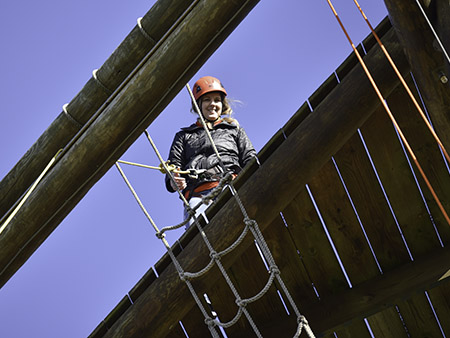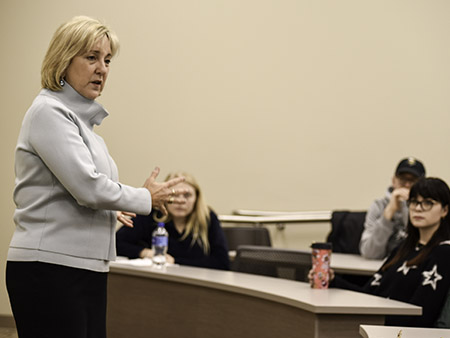In a time where you can do virtually everything with a few clicks of a mouse, remote teams are increasingly becoming routine in the workplace. With the digital era ushering in a revolution in communication and collaboration, Dr. Tawnya Means, assistant dean, assistant professor of practice in management and director of the Teaching and Learning Center, is preparing students at the University of Nebraska–Lincoln to effectively lead and communicate online through the Leadership, Communication and Teams in the Virtual World (MNGT 470) course offered at the College of Business.
Breaking the mold of a traditional college course, the classroom became one of the less frequent spots students met. The times the students did gather in person, guest speakers from local businesses would share their expertise on leading and working with teams over long distances through online services. As the professor of the course, Means believes the material covered is not only useful to students, but a necessity moving forward into their careers after graduation.
 Dr. Tawnya Means climbed to the top of the high ropes obstacle course.
Dr. Tawnya Means climbed to the top of the high ropes obstacle course.
“We have to prepare students to be adaptable and understand the world they live in right now is not going to be the world they see in five or 10 years. A big piece of what I want them to gain from this class is adaptability – opening their minds up to see the world is changing. It is exciting and challenging. You have to approach it from a perspective of a growth mindset. Being willing to change and move forward and not being tied down to a traditional concept of what work is – technology facilitates a lot of that,” said Means.
Students gained hands-on experience with a variety of tools and software which companies around the world use. They familiarized themselves with programs many of them had never used before, such as Slack, a cloud-based set of proprietary team collaboration tools and services, or Basecamp, a project management tool. Through their use of these programs, students gained valuable experience they can take with them after graduation and apply to their careers.
Lynn Diep, a senior international business major from Lincoln, Nebraska, knew this course would serve valuable to her future endeavors. With expectations of working on remote teams in her future, Diep found the coursework to be the experience she needed for her career goals.
“This class had also taught me how important it is for team bonding for remote teams since they are so different from traditional teams,” she said. “I was able to experience, learn about and use all kinds of applications for communication, such as Zoom and Slack, that I’ve never used before. I have come to find out a lot of professionals who meet online use these tools regularly.”
 Dr. Donde Plowman, executive vice chancellor and chief academic officer, spoke to the students about leadership.
Dr. Donde Plowman, executive vice chancellor and chief academic officer, spoke to the students about leadership.
During one of the in-person class meetings, Means gathered the students at Nebraska’s outdoor challenge course. Through various team-building activities and climbing a high-ropes obstacle course, students learned about effective leadership and communication in a direct approach. Even though the students had only met a handful of times before this, they all worked hand-in-hand through the team-building activities, strengthening bonds and building trust in one another.
Orest Shestak, a visiting student at Nebraska who is originally from Ukraine, found the class to be more similar to a mentorship than a traditional college course. He thought the mix of the classwork done online and the in-person meetings to be beneficial in learning about his own behavioral patterns when it came to working online. He took what he learned in the class and immediately applied it right away to his own personal and professional life.
“In the real world, I am a member of a group that's spread across Ukraine, Canada and the U.S. Thanks to the class, I learned to pay closer attention to how my messages can be interpreted. This already helped me avoid some conflicts,” he said. “I received something I wasn't even hoping to get when I signed up for the class – confidence that I can succeed in building a lasting team that can bring value to society.”
Published: January 8, 2019